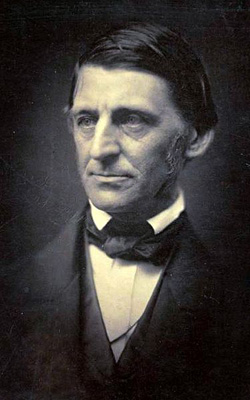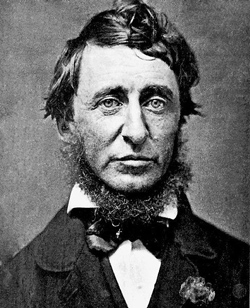Your Turn

Source: Ralph Waldo Emerson, George Eastman House Collection, Wikimedia Commons
Below you will read paradoxical statements made by the nineteenth-century American authors Ralph Waldo Emerson and Henry David Thoreau. The paradoxes written by Emerson are drawn from the essay “Nature” in which he tells us that we can feel real delight in the presence of the divine in nature.
Read the excerpt and record your answers to the questions using your notes. When you're finished, roll over the last word of each question to check your understanding.
“I am not solitary whilst I read and write, though nobody is with me.”
“To speak truly, few adult persons can see nature. Most persons do not see the sun.”
“I am glad to the brink of fear.”
- What paradoxical claim does Emerson make about reading in the first statement?
- In the second statement, Emerson is not using the verb “see” in a literal sense pertaining to vision. What is he claiming about how most adults “see” nature?
- What seemingly contradictory terms does Emerson present in the third statement? What claim is he making through this paradox?
Sample Response:
Emerson claims that a person is communicating with the author when he is alone with a book. Thus, the reader is not really “alone” and reading is not really a “solitary” or lonely activity.
CloseSample Response:
Emerson claims that most people do not appreciate nature. They take for granted the splendor of nature.
CloseSample Response:
The contradictory terms are “glad” and “fear.” Emerson claims that a person can experience such intense happiness that it can become frightening.
Close
Source: Henry David Thoreau, Benjamin D. Maxham, Wikimedia Commons
The paradoxes created by Thoreau are drawn from an essay entitled “Resistance to Civil Government” in which he describes his opposition to slavery and the War with Mexico. Thoreau greatly influenced twentieth-century advocates of nonviolent civil disobedience, including Mahatma Gandhi and Martin Luther King Jr. In his writing, he also urges people to do what they feel is right and stresses that they are morally obligated not to support what they feel is wrong even if it is law.
Read the excerpt and record your answers to the questions using your notes. When you’re finished, roll over the last word of each question to check your understanding.
I have paid no poll tax for six years. I was put into a jail once on this account, for one night; and, as I stood considering the walls of solid stone, two or three feet thick, the door of wood and iron, a foot thick, and the iron grating which strained the light, I could not help being struck with the foolishness of that institution which treated me as if I were mere flesh and blood and bones, to be locked up. I wondered that it should have concluded at length that this was the best use it could put me to, and had never thought to avail itself of my services in some way. I saw that, if there was a wall of stone between me and my townsmen, there was a still more difficult one to climb or break through before they could get to be as free as I was. I did not for a moment feel confined, and the walls seemed a great waste of stone and mortar. I felt as if I alone of all my townsmen had paid my tax.
- Thoreau believed strongly in the individual citizen’s obligation to protest perceived government wrongdoing in a nonviolent manner. Quote Thoreau’s exact words in claiming that protesting an unjust government policy can actually be more patriotic and civic-minded than supporting that policy unquestioningly. Explain his paradoxical statement.
- Thoreau famously spent a night in jail in punishment for not paying his taxes. Legend has it that his embarrassed aunt (hiding her identity behind a dark veil) actually came to the jail and paid the tax for her nephew. Thoreau, however, insisted on remaining behind bars through the night. Quote Thoreau’s exact words in claiming that, while he may have been imprisoned literally, some people are imprisoned by walls of conformity.
Sample Response:
“I felt as if I alone of all my townsmen had paid my tax.” You might have said that we usually think of paying our taxes as a patriotic or civic responsibility. Thoreau, however, felt that he had fulfilled his duty as a citizen by not paying his taxes in protest of slavery and the War with Mexico (which would expand the practice of slavery).
CloseSample Response:
“I saw that, if there was a wall of stone between me and my townsmen, there was a still more difficult one to climb or break through before they could get to be as free as I was.”
Close